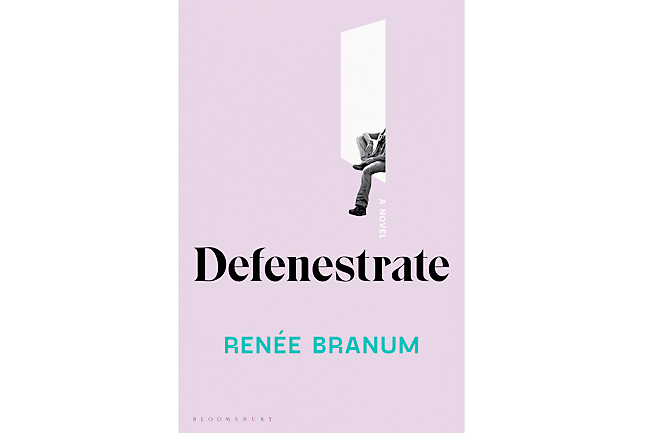Hamilton Cain
THE WASHINGTON POST – On the morning of May 1, 1947, 23-year-old Evelyn McHale kissed her fiance at his home in Pennsylvania, boarded a train for Manhattan’s Penn Station, disembarked and walked to the lobby of the Governor Clinton Hotel, where she spent more than an hour composing a letter.
She tucked the paper into her pocketbook and strolled two blocks east to the Empire State Building, where she took an elevator to the 86th floor observation deck. She draped her coat over the railing before she leaped, crashing into a car parked along West 34th Street.
Four minutes later a photographer snapped an image as iconic as the napalmed child in Vietnam: McHale, sprawled atop crumpled metal, her face tranquil.
Still known colloquially as “the most beautiful suicide”, McHale makes a cameo appearance in Renée Branum’s stylish, shimmering debut, Defenestrate, along with Buster Keaton; the Czech writer Bohumil Hrabal; and Juliane Koepcke, the teenager who survived a nearly two-mile plunge when her plane disintegrated over the Amazon rainforest in 1971. Branum breaks up her novel into fragments, some only a paragraph long, and each with its own subhead. There’s a diaphanous flow to her storytelling, full of light and air, with darker notes that play off our hard-wired terror of falling, or basophobia.
The novel’s narrator, Marta, is a young woman determined to save her adored twin brother, Nick, from the family curse that stalks them. Their great-great-grandfather, Jirí, allegedly shoved a Roma stonemason from a steeple in Prague, inaugurating a series of mishaps and pratfalls handed down the ladder of generations.

Defenestrate opens with Nick recuperating in a Midwestern hospital, injured in a near-tragic plummet from his apartment balcony. Branum toggles between present and past, adroitly meting out her plot. We meet the twins’ family in flashbacks: Their father is kindhearted but inwardly directed, crafting model trains and toy landscapes; their mother’s a frigid religious woman who chants prayers and spins morality tales of cousins who fell from windows.
The twins dance around a grenade: a quarrel possibly triggering their father’s fatal cardiac arrest. Repulsed by Nick’s behaviour, their mother banishes him from her life. Marta, ever her brother’s keeper, joins him in an escape to Prague, where they search for clues to the legend of Jirí and other punitive defenestrations. “Tourists can climb the narrow stairs to the room where noblemen were defenestrated because of a religious dispute in 1618. You can look down from the window to see exactly the length of their fall,” she said. “These men were said to have been saved by angels. Others said the men survived because they landed in a dung heap piled below the window.”
Meanwhile, Marta begins to suspect her brother is in the throes of a mental health crisis, perhaps suicidal. After an idyll punctuated by shoplifting, drunken nights and Nick’s promiscuity, the twins return home, maintaining their estrangement from their mother.
And then Nick falls.
Some sections feel like padding, as though Branum is trying to convince herself (and us) that Defenestrate is more than a short story masquerading as a novel. She flirts with preciosity, particularly in her overbearing use of Keaton. But in a feat of literary archery, Branum’s lyrical prose hits its mark again and again, rich but never overly ripe, delicate but with a tautness that propels the narrative.
The trope of twins ensnared with each other traces back to Castor and Pollux, Jacob and Esau, but she makes it fresh. And the novel’s spare, ghostly mood recalls Jeffrey Eugenides’s The Virgin Suicides.
Branum, too, brilliantly contrasts her twin settings: glittering, exotic Prague and the flat, dull prairie town. The Czech capital emerges as the novel’s real star; as Marta observes, “During a holiday, the squares would offer themselves up to you even if you had no money to spend in the shops. In one of the squares there was a skating rink where a heavy man in a dark coat could always be seen struggling over the ice, the blades of his skates making jagged, punctuated lines, like dashes of Morse code.”
Evocative passages like this one stud the novel like diamonds. The story cuts back and forth, brimming with suspense. It’s always a joy to see a writer dig confidently into her gifts, as Branum does in Defenestrate. Her characters may fear falling, but this novel soars.



















































